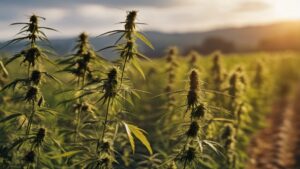Hemp vs. Marijuana: What’s the Difference?
When asking “what is hemp,” it’s important to understand that both hemp and marijuana are the same species: Cannabis sativa. The key difference lies in their THC content, which is the cannabinoid responsible for the “high” associated with cannabis.
Difference Between Hemp and Marijuana
It’s a common misconception that hemp and marijuana are distinct species of plants. In reality, they are both names for the cannabis plant, a member of the Cannabaceae family. Scientifically, there’s no distinction between them, but legally, the difference is significant.
What is Hemp?

What is Marijuana?
Marijuana, on the other hand, is cannabis that contains more than 0.3 percent THC by dry weight. This higher THC content gives marijuana its psychoactive properties. The term “marijuana” is often used interchangeably with “weed” and other colloquial terms. Legally, marijuana refers to any cannabis plant that exceeds the 0.3 percent THC threshold.
Historical Context and Controversy
The term “marijuana” has controversial roots tied to early 20th-century racism in the United States. During the Mexican Revolution, many Mexicans immigrated to the U.S., bringing cannabis with them. The term “marijuana” became associated with these immigrants, leading to anti-cannabis propaganda that perpetuated racist stereotypes and contributed to the criminalization of cannabis in the 1930s. Today, many prefer using the term “cannabis” to avoid these negative connotations, though this can be confusing since it encompasses both hemp and marijuana.
Uses of Hemp and Marijuana
Hemp Uses:
- Industrial Products: Hemp is incredibly versatile and can be used to produce paper, clothing, textiles, animal feed, plastic, and various food products such as hemp seed, hemp milk, hemp protein powder, and hemp oil. Because it grows faster than trees and other crops, hemp is considered a more sustainable resource for producing these goods.
- Nutritional Benefits: Hemp seeds are highly nutritious, offering a complete protein source high in fiber.
Marijuana Uses:
- Medical and Recreational: Marijuana is primarily known for its psychoactive effects due to its higher THC content. It’s used both recreationally and medically for purposes such as pain management. Strains high in THC may produce a “high,” while those lower in THC but higher in other cannabinoids like CBD may offer medical benefits without intoxication.
Legal Status
The legal difference between hemp and marijuana is significant. The 2018 Farm Bill legalized the cultivation of hemp (cannabis with less than 0.3 percent THC) and hemp-derived CBD products at the federal level. Marijuana, however, remains federally illegal, although state laws vary widely. Some states allow marijuana for medical and recreational use, others permit it only for medical purposes, and some states still prohibit it entirely.
CBD and Its Legality
Cannabidiol (CBD), a cannabinoid found in all cannabis plants, has gained popularity for its potential health benefits. CBD products are only federally legal if derived from hemp and containing less than 0.3 percent THC. This makes hemp a critical source for legal CBD products.
Takeaway
Understanding “what is hemp” involves recognizing its legal definition and uses. Hemp and marijuana are both cannabis plants, but they are differentiated by their THC content. Hemp, with 0.3 percent or less THC, is used for a wide range of industrial and nutritional purposes and is legal in many areas. Marijuana, with more than 0.3 percent THC, is known for its psychoactive effects and varying legality. Both plants offer valuable products, but their uses and legal statuses are distinctly different.







